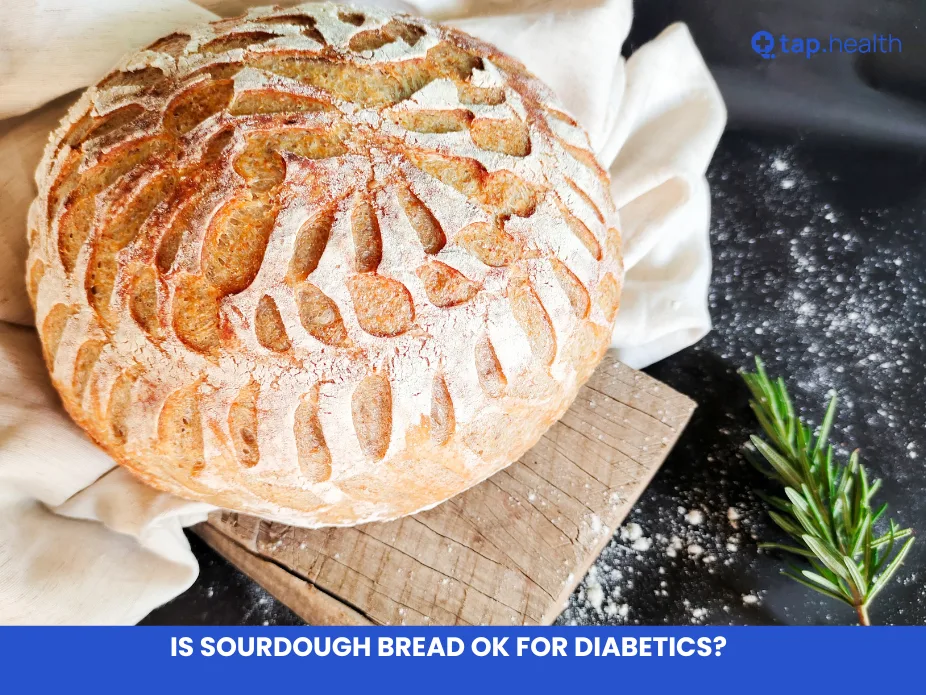Managing diabetes involves making informed dietary choices to maintain stable blood sugar levels. A common question is whether sourdough bread is a suitable option for individuals with diabetes. Let’s explore this topic to understand the implications.
Understanding Sourdough Bread
Sourdough bread is made through a fermentation process involving flour, water, and naturally occurring lactobacilli and yeast. This process not only imparts a unique tangy flavor but also affects the bread’s nutritional profile. The fermentation reduces the bread’s glycemic index (GI), which is a measure of how quickly a food raises blood sugar levels. For comparison, traditional white bread has a GI of around 71, while sourdough bread has a GI of approximately 54, placing it in the low-GI category.
Glycemic Index and Diabetes
Foods with a low GI are absorbed more slowly, leading to gradual increases in blood sugar levels. This slow absorption is beneficial for individuals managing diabetes, as it helps in maintaining stable blood sugar levels. Sourdough bread’s lower GI, compared to other breads, makes it a preferable choice for diabetics.
Cleveland Clinic Health Essentials
Real-Life Scenario: Rajesh’s Experience
Consider Rajesh, a 50-year-old man from Delhi managing Type 2 diabetes. He switched from white bread to sourdough bread, believing it would be gentler on his blood sugar levels. After monitoring his glucose readings, he noticed a more stable blood sugar response post-meal. This experience highlights that sourdough bread may offer a better option for blood sugar control compared to traditional white bread.
Health Benefits of Sourdough Bread
Beyond its lower GI, sourdough bread offers several health benefits:
- Improved Digestibility: The fermentation process breaks down gluten and phytic acid, making the bread easier to digest and enhancing nutrient absorption. Verywell Health
- Higher Resistant Starch Content: Sourdough bread contains resistant starch, a type of carbohydrate that resists digestion in the small intestine. This slow digestion helps in regulating blood sugar levels. SingleCare
- Enhanced Nutrient Profile: The fermentation process increases the availability of minerals like magnesium and zinc, contributing to overall health. Verywell Health
Expert Contributions
Dr. Ramesh Kumar, an endocrinologist based in Mumbai, advises that while sourdough bread has a lower glycemic index compared to white bread, portion control remains crucial. He recommends that diabetics monitor their carbohydrate intake and consider incorporating sourdough bread made from whole grains for added fiber benefits.
Recommendations Grounded in Proven Research and Facts
- Choose Whole Grain Sourdough: Opt for sourdough bread made from whole grains, as it contains more fiber, which can help in controlling blood sugar levels. Wildgrain
- Monitor Portion Sizes: Even with its lower GI, consuming large portions of sourdough bread can impact blood sugar levels. It’s essential to practice portion control.
- Combine with Protein and Healthy Fats: Pairing sourdough bread with protein and healthy fats can further slow the absorption of carbohydrates, leading to more stable blood sugar levels.
- Consult Healthcare Providers: Before making significant dietary changes, it’s advisable to consult with a healthcare professional or a registered dietitian to tailor advice to your individual health needs.
Factual and Reliable Information
Sourdough bread’s lower glycemic index and higher resistant starch content make it a preferable choice for individuals managing diabetes. However, it’s important to consider the type of flour used, portion sizes, and overall carbohydrate intake to effectively manage blood sugar levels.
FAQ on Is Sourdough Bread Safe for Diabetics?
1. Is sourdough bread better for diabetics than white bread?
Yes, sourdough bread has a lower glycemic index compared to white bread, leading to slower increases in blood sugar levels.
Cleveland Clinic Health Essentials
2. Can diabetics consume sourdough bread in moderation?
Yes, diabetics can include sourdough bread in their diet in moderation, especially when made from whole grains. It’s important to monitor portion sizes and overall carbohydrate intake.
3. What are the benefits of sourdough bread for diabetics?
Sourdough bread offers benefits such as improved digestibility, higher resistant starch content, and an enhanced nutrient profile, all of which can aid in blood sugar management.
4. How does sourdough bread affect blood sugar levels?
The fermentation process in sourdough bread reduces its glycemic index, leading to slower absorption of carbohydrates and more stable blood sugar levels.
Cleveland Clinic Health Essentials
5. Are there any downsides to consuming sourdough bread for diabetics?
While sourdough bread has a lower glycemic index, it’s still important to consume it in moderation and be mindful of portion sizes to effectively manage blood sugar levels.



